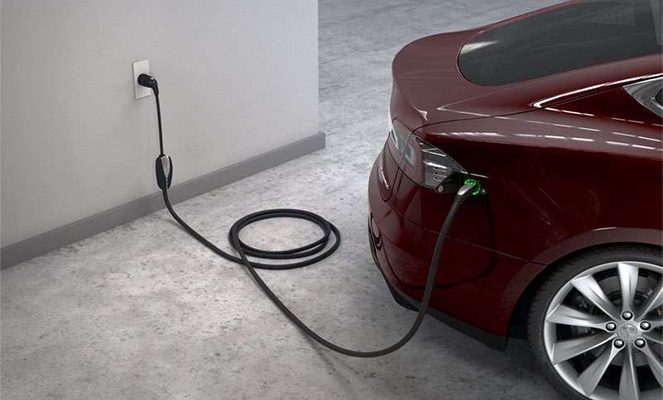
How to charge an electric car
Content
- Charging an electric car at home
- Charging an electric car at work
- Charging an electric car at public charging stations
- Charging an electric car on long journeys
- More EV guides
- Applications
- Types of cables
- How long does it take to charge an electric vehicle?
- How much does it cost to charge an electric vehicle?
The UK is currently the second largest EV market in Europe and a recent YouGov survey found that 61% of UK motorists are considering buying an EV in 2022. But owning an electric car means getting used to a few new things and learning how to charge it.
There are three main ways to charge your electric car: at home, at work, and at public charging points, which can be fast, fast, or slow. Since most electric vehicles are charged at home, let's start with that.
Charging an electric car at home
If you have off-street parking, the easiest and cheapest way to charge your electric car is in your own driveway. You may be able to install your own wall outlet charger such as Lightweight charger. They usually have a smartphone app that you can download to monitor charging and schedule sessions during low peak hours to save money.
If you do not have your own parking space, you can install a wall charger outside the building and run the cable to a car parked outside. Think of it like charging your smartphone: plug it in overnight, charge it up to 100%, and charge it again when you get home in the evening.
If you are running a cable along a sidewalk, you should consider the potential risk of tripping and consider covering the trailing cable with a guard. If in doubt, check with local authorities.
Some chargers allow more than one electric vehicle to be connected at the same time, and most chargers come with a cable, but you can also use the manufacturer's cable that came with your car.
You can also use a standard three-prong outlet to recharge your EV battery, but this will take much longer than using a dedicated charger. It's also not that safe because high demand for electricity over long periods of time can cause overheating, especially in old wiring, so it's only recommended in rare cases.
Charging an electric car at work
Charging at the workplace can be another useful option for you. With more companies offering free charging to employees as a perk, plugging in while you work gives you plenty of time to fully charge your car's battery for free. Most workplace chargers are likely to work gradually over a long period of time like a household outlet, but some companies may offer fast chargers that only take a couple of hours. Typically, workers are given an access card or download app to start these charging sessions, although sometimes the devices are simply left unlocked.
Charging an electric car at public charging stations
You may have noticed public chargers at the supermarket or down the street, which could be a way to recharge your battery while you run errands. Some supermarkets and gyms offer free charging to customers, but outdoor chargers tend to be plug and pay. You can usually pay with a contactless card using an app or by scanning a QR code on your phone and paying online. You may need to use your own charging cable, so be sure to keep one in your car.
Charging an electric car on long journeys
If you are driving a longer distance, you may need to recharge your electric vehicle's battery along the way. This usually means that you need to schedule stops at "fast" chargers, which are powerful devices that can replenish your battery very quickly. They tend to be more expensive but are easy to use - plug them in and you can boost your battery capacity up to 80% in just 20 minutes. This is a great opportunity to stretch your legs, get some fresh air or have a coffee while you wait.
More EV guides
How to increase the range of your electric car battery
Should you buy an electric car?
Electric Vehicle Battery Guide
Applications
When it comes to charging your electric car, apps are your best friend. Apps like Zap-Map и ChargePoint show you nearby chargers and see if anyone is currently using them, and even explain possible payment methods. This is very useful when planning a route around charging stations.
If you're a frequent user of public chargers, you might want to download and subscribe to services like Shell. Ubitriality, Source London or Pulse AD. For a monthly fee, you get unlimited access to a network of charging points, which can be a great way to reduce the cost of each charge.
Home charging apps are useful for getting the most out of Wallbox smart charging, low electricity rates and energy management. You can track your spending, schedule your charging to take advantage of off-peak rates, and pause or resume charging remotely. Some electric vehicles come with apps that also allow you to schedule charging times.
Types of cables
Do you know how different brands of mobile phones use different charging cables? Well, electric cars are similar. Conveniently, however, most new EVs come with the same type 2 cable that can be used for both home charging and slow charging at public chargers. Type 2 is the most common type of charging cable.
Fast chargers, such as those found at motorway service stations, use a DC cable that can handle higher currents. This type of cable will have one of two different connectors called CCS and CHAdeMO. Both are suitable for fast chargers, but CCS connectors are more commonly used in new electric vehicles.
How long does it take to charge an electric vehicle?
The time it takes to charge an electric vehicle depends on the size of the battery, the speed of the charging point, and the design of the vehicle in question. Generally, the faster the charge point speed and the smaller the car battery, the faster the charge will be. More modern vehicles are often compatible with faster fast charging speeds.
Keep in mind that most batteries charge much faster to 80% than they do from 80% to 100%, so if your battery is low, a quick charge home can take as little as 15-30 minutes.
As a rough guide, an older, smaller EV, such as 24 kWh. Nissan Leaf, it will take about five hours to charge to 100% from a home charging point, or half an hour from a fast public charge.
How much does it cost to charge an electric vehicle?
It all depends on your home electricity tariff and you can easily figure it out. Simply find out the size of the battery in the car you are about to buy, which will be measured in kilowatt hours (kWh), and then multiply that by the cost of electricity per kWh. For example, if you have a Nissan Leaf with a 24 kWh battery and each kWh costs you 19p, a full charge will cost you £4.56.
Public charging usually costs more than home charging, but it depends on the provider, your battery size, and whether you have a subscription. For example, at the time of writing in early 2022, charging a 24kWh Nissan Leaf from 20% to 80% will cost you £5.40 with Pod Point Fast Charging. Most charging providers provide examples online, and you can also use online charging calculators for a personalized estimate.
There are many used electric cars for sale in Kazu. you also can get a new or used electric car with Cazoo subscription. For a fixed monthly fee, you get a new car, insurance, maintenance, maintenance, and taxes. All you have to do is add fuel.
